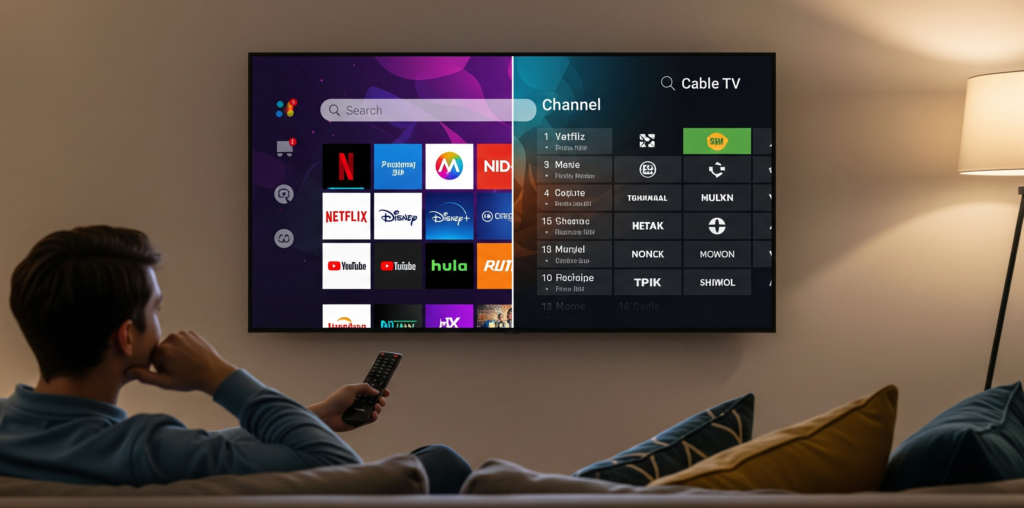The way we watch television has changed dramatically. For decades, cable TV was the default choice in many homes—reliable, simple and familiar. Today, it faces a strong challenger: IPTV (Internet Protocol Television), which promises more flexibility, a bigger content library and modern features. But which one should you choose?
This in-depth guide explains the core differences between IPTV and cable, highlights the pros and cons of each option, and helps you decide based on your priorities: reliability, price, device compatibility, or content variety. If you’re considering IPTV, we also explain how to pick a trustworthy provider and what to check before you subscribe.
1. How the Technologies Work
What is Cable TV?
Cable TV delivers channels through a physical coaxial cable connected to your home. The transmission is generally one-way: the provider sends a linear stream of channels that you receive through a set-top box or decoder. The broadcast schedule is fixed and channels are typically grouped into pre-set bundles.
The main advantage of cable is its stability—since it does not rely on your internet connection, you rarely experience buffering caused by home network congestion.
What is IPTV?
IPTV delivers television content over your internet connection. The stream is two-way, enabling interactive features such as Video-on-Demand (VoD), pause/rewind of live TV, cloud recording and multi-device access. IPTV can offer live channels, catch-up TV and huge VOD libraries.
The key trade-off: IPTV quality depends on the speed and stability of your internet connection. With a strong connection, you can get high-resolution streams (Full HD, 4K). With a weak connection, you risk buffering and degraded quality.
2. Side-by-Side Comparison: 6 Key Factors
2.1 Picture Quality & Stability
Cable TV: Offers consistent picture quality due to a dedicated transmission path. It’s less likely to cut out during live sports or breaking news.
IPTV: Can deliver 4K and higher resolutions, sometimes with better compression and features. However, picture quality is vulnerable to internet drops and bandwidth limits.
2.2 Content Variety & Flexibility
Cable: Typically sells channel packages with limited customization. The offering is mostly linear—programming airs on a schedule.
IPTV: Excels in variety and flexibility: international channels, on-demand movies and series, themed packages, and add-ons. IPTV often provides a richer VoD catalog than most cable packages.
2.3 Cost & Pricing Models
Cable packages are often bundled with internet and phone (triple play), which can be convenient but costly and often come with contracts. IPTV subscriptions are usually more affordable, pay-as-you-go, and without long-term commitments—ideal if you want to switch providers or try a new service.
2.4 Device Compatibility
Cable typically requires a physical set-top box and limits viewing to the TV where the decoder is installed. IPTV is device-agnostic: Smart TVs, Android TV boxes, Amazon Fire Stick, smartphones, tablets and PCs are all supported—meaning you can watch anywhere with an internet connection.
2.5 Interactivity & Advanced Features
Cable offers basic features like DVR (on a local hard drive supplied by the operator). IPTV adds advanced interactivity: cloud DVR, pause and rewind live TV, catch-up for days or weeks, personalized recommendations and integrated VOD.
2.6 Installation & Technical Requirements
Cable usually requires a technician visit for physical installation. IPTV setup is mostly software-based: install an app, enter credentials or a playlist, and you’re ready—provided you have a reliable internet connection.
3. Pros and Cons — Quick Overview
Advantages of Cable TV
- Highly stable signal with minimal buffering.
- Independent from home internet performance.
- Simple to use for non-technical users.
Drawbacks of Cable TV
- Rigid packages with limited personalization.
- Higher cost and often long-term contracts.
- Limited mobility—usually tied to a single set-top box.
Advantages of IPTV
- Flexible subscription models and lower prices.
- Extensive VoD libraries and international channel choices.
- Multi-device support and advanced features (cloud DVR, catch-up).
Drawbacks of IPTV
- Performance depends on internet speed and stability.
- May require basic technical setup or troubleshooting.
- Quality varies greatly between providers.
4. Which Option Suits You? Practical User Profiles
Ultimately, the right choice depends on your priorities. Here are common user scenarios to help you decide:
- Prefer freedom and on-demand content: IPTV is the better fit—ideal for binge-watchers and international viewers.
- Need absolute reliability (live sports, breaking news): Cable remains the safest choice when you cannot tolerate buffering.
- Budget-conscious and mobile: IPTV offers better value and the ability to watch on multiple devices.
- Poor or unstable internet connection: Cable will offer a more consistent viewing experience.
5. Tips for Moving to IPTV (If You Decide to Switch)
- Check your internet speed: aim for 15–25 Mbps for HD and 30+ Mbps for 4K streaming per active device.
- Test the IPTV service with a trial account when possible.
- Choose a provider with clear server capacity, device compatibility and responsive customer support.
- Use Ethernet instead of Wi-Fi for critical viewing (live sports) or consider a mesh Wi-Fi system for better coverage.
- Read reviews and ask about refund or trial policies before committing.
If you want a fast way to compare reliable options, check out our IPTV subscription plans and see which package matches your viewing habits and budget.
6. Final Thoughts
There is no universal answer to “IPTV or cable?” in 2025. Cable TV still leads in stability and simplicity, making it the preferred option for viewers who prioritize an interruption-free experience. IPTV, on the other hand, represents the modern, flexible alternative: lower cost, richer content libraries and advanced features—perfect for users with a reliable internet connection and a desire for freedom.
Make your decision based on your internet quality, budget, device ecosystem and how you like to watch TV. And if you decide to try IPTV, pick a provider known for server stability and solid customer support to avoid the most common issues.
👉 Ready to test IPTV? Explore our reliable IPTV plans and start a trial to see if it fits your lifestyle.



